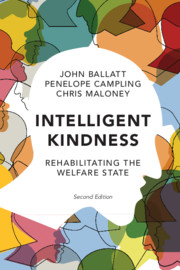Book contents
- Intelligent Kindness
- Reviews
- Intelligent Kindness
- Copyright page
- Contents
- Foreword
- Authors’ Note
- Chapter 1 The Heart of the Matter
- Chapter 2 Rescuing Kindness
- Chapter 3 A Politics of Kindness
- Chapter 4 Building the Case for Kindness
- Chapter 5 Managing Feelings of Love and Hate
- Chapter 6 The Emotional Life of Teams
- Chapter 7 Cooperation and Fragmentation
- Chapter 8 On the Edges of Kinship
- Chapter 9 Unsettling Times
- Chapter 10 Free to Serve the Public?
- Chapter 11 Blame
- Chapter 12 The Hostile Environment
- Chapter 13 The Pull towards Perversion
- Chapter 14 Cultivating Intelligent Kindness
- Chapter 15 Rehabilitating the Welfare State
- Index
- About the Authors
- Acknowledgements
- References
Chapter 13 - The Pull towards Perversion
Published online by Cambridge University Press: 28 February 2020
- Intelligent Kindness
- Reviews
- Intelligent Kindness
- Copyright page
- Contents
- Foreword
- Authors’ Note
- Chapter 1 The Heart of the Matter
- Chapter 2 Rescuing Kindness
- Chapter 3 A Politics of Kindness
- Chapter 4 Building the Case for Kindness
- Chapter 5 Managing Feelings of Love and Hate
- Chapter 6 The Emotional Life of Teams
- Chapter 7 Cooperation and Fragmentation
- Chapter 8 On the Edges of Kinship
- Chapter 9 Unsettling Times
- Chapter 10 Free to Serve the Public?
- Chapter 11 Blame
- Chapter 12 The Hostile Environment
- Chapter 13 The Pull towards Perversion
- Chapter 14 Cultivating Intelligent Kindness
- Chapter 15 Rehabilitating the Welfare State
- Index
- About the Authors
- Acknowledgements
- References
Summary
The organisations that make up our ‘Welfare State’ sit within a broader society that shapes their rules and arrangements, and the conscious and unconscious social pacts that allow them to function. In Chapter 1, we noted the spirit of cooperation that was around in the immediate aftermath of the Second World War, and how this provided a value base and a fertile ground for implementing the Welfare State. Since then this communalism has been steadily encroached upon by individualism, consumerism and a shift towards ‘the market’. Living standards have risen, vastly more material goods are available, and the trauma of the War has receded: yet at the same time we are preoccupied with financial constraints, and the limitations of what may be provided. What type of changes have these shifts brought about in our civic institutions? What have the negative consequences been, and are these safely outweighed by the positive?
Information
- Type
- Chapter
- Information
- Intelligent KindnessRehabilitating the Welfare State, pp. 185 - 203Publisher: Cambridge University PressPrint publication year: 2020
References
Accessibility standard: Unknown
Why this information is here
This section outlines the accessibility features of this content - including support for screen readers, full keyboard navigation and high-contrast display options. This may not be relevant for you.Accessibility Information
- 1
- Cited by
